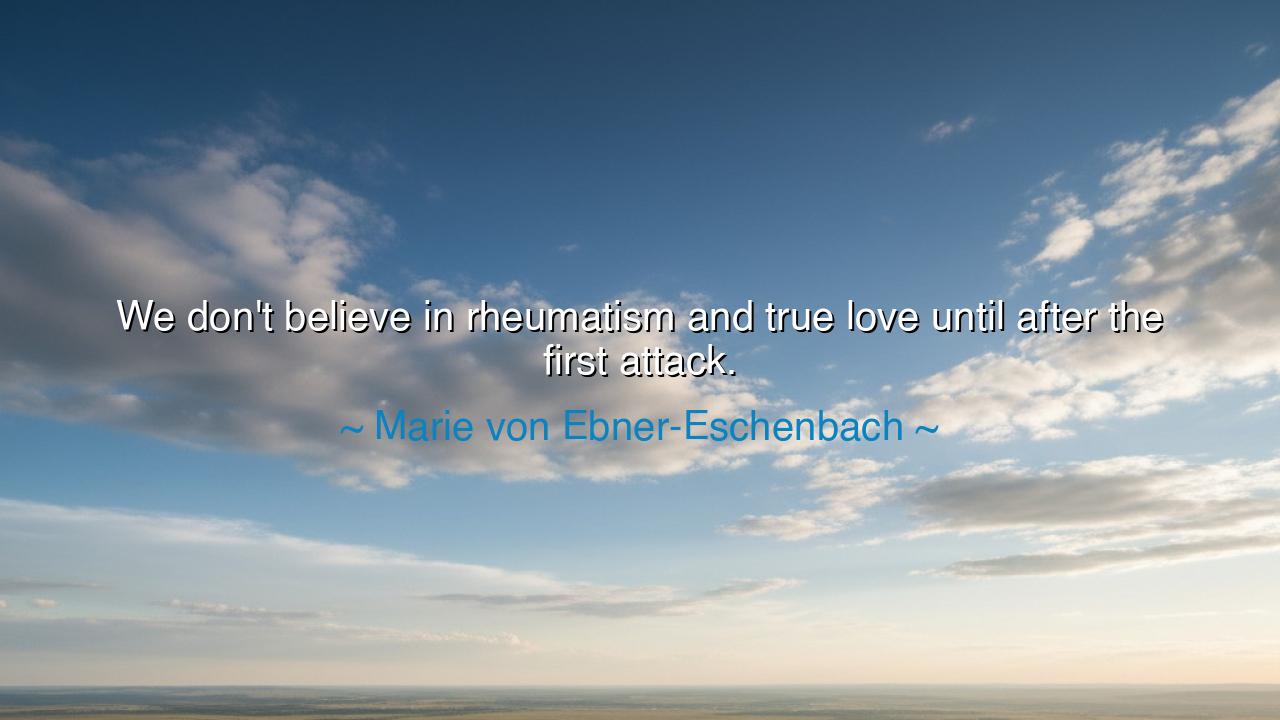
We don't believe in rheumatism and true love until after the






"We don't believe in rheumatism and true love until after the first attack." These words from Marie von Ebner-Eschenbach reveal a profound and often overlooked truth about the nature of love and the trials we face in life. Both rheumatism and true love are forces that we often fail to recognize or understand until we are confronted with their full power. In the beginning, we may dismiss the possibility of suffering or the depths of feeling that these forces bring, but it is only when we are struck by them—whether through pain or passion—that we come to truly grasp their significance. Like the onset of an illness, or the overwhelming rush of love, their presence is not always recognized until we are immersed in them fully, and only then can we begin to understand their true nature.
O children of the earth, consider this: the wisdom of the ancients often taught that it is through hardship that we are shaped, through struggle that we grow. Love, in its purest form, is not merely a pleasant feeling that we hold lightly; it is a powerful, often overwhelming force that can consume us and transform us. It is in the first attack—whether it is the first ache of rheumatism or the first moment of deep, passionate love—that we begin to understand what these forces truly mean. Until then, we may dismiss them, fail to give them the weight they deserve. It is only when they make themselves known to us in full force that we are forced to reckon with them.
Think of the legendary Socrates, who, though renowned for his wisdom, was not immune to the trials of life. His love for philosophy and truth was not always easy; it often led him to face hostility, pain, and ridicule. Yet, it was through these trials that his love for knowledge deepened, and he learned that true love, whether for wisdom, another person, or life itself, requires commitment, endurance, and an acceptance of pain. It was only after facing great personal hardship—both in the form of persecution and the internal struggle of seeking truth—that Socrates’ understanding of love reached its fullest depth. Love, like rheumatism, was not something to be taken lightly or dismissed; it demanded an active, ongoing engagement with the world, despite the pain it might cause.
The same can be said for true love in human relationships. It is often idealized, imagined as a perfect, painless union. Yet, when we fall in love, we may be unprepared for the trials and tribulations that come with it—the misunderstandings, the sacrifices, and the heartache that inevitably follow. True love is not something we merely believe in from afar; it is something we must live through, experience in all its fullness, including the moments of pain and suffering that test our commitment. The first “attack” of love, when it strikes with unexpected force, challenges us to reconsider our understanding of it. It is then, in the midst of vulnerability and suffering, that we realize how much deeper love goes than we could have ever anticipated.
Take the example of Elizabeth Barrett Browning, whose love for Robert Browning was not an easy or straightforward affair. Elizabeth, a renowned poet, was not initially allowed to marry Robert due to her father’s opposition, and her health was frail, causing her much suffering. Yet, it was through the pain and the struggle that their love grew stronger. Their true love was not realized in the calm moments of joy but in the intensity of their passion and the perseverance through the challenges they faced. They both endured much—physically, emotionally, and socially—yet through this love, they found a deeper connection that transcended the obstacles of their circumstances. Their story exemplifies how true love often doesn’t arrive without struggle or hardship, but instead blooms through it, much like the healing that comes after a difficult illness.
And so, O children, the lesson of Ebner-Eschenbach’s words is clear: we often do not truly know love or the challenges it brings until we are face-to-face with its power. The first attack—whether of rheumatism or the first wave of love—forces us to confront what we had previously dismissed or failed to understand. But once we do, we come to see that love is not a fleeting emotion, nor a simple feeling that can be avoided or ignored. It is a force that demands commitment, sacrifice, and, at times, suffering. Yet, it is also in this very suffering that we come to appreciate the true depth and beauty of love.
In your own lives, remember this truth: love and suffering are often intertwined, and it is only through experience—through the trials we face—that we come to understand the depth of love. Do not fear the struggles that come with loving deeply, for they are the very forces that shape your understanding and strengthen your heart. And do not believe that love is without cost; it will ask you to sacrifice, to endure, and to face pain. But through it all, you will find that true love—like all great things—is forged in fire, and when it endures the trial, it emerges stronger, more beautiful, and more profound.






AAdministratorAdministrator
Welcome, honored guests. Please leave a comment, we will respond soon